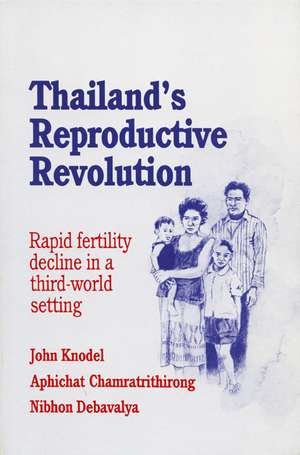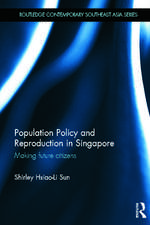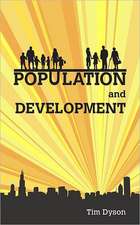Thailand Reproductive Revolution: Social Demography
Autor John Knodelen Limba Engleză Paperback – 14 aug 1987
In the 1980s, Thailand experienced a remarkable revolution in reproductive behavior, resulting in a rapidly declining fertility rate. The authors of this book follow an unusual approach that combines qualitative and quantitative methods to explore the reasons for this decline. Their work makes possible a thorough understanding, in demographic, socioeconomic, and cultural terms, of a phenomenon of critical importance to Developing World population trends and development.
The Thai experience is an especially important case study in part because its fertility decline took place while the country was still at only a moderate stage of socioeconomic development and because the changes in reproductive behavior and attitudes have been so pervasive, permeating almost all segment so of Thai society.
The authors have amassed an impressive amount of data, which they present and interpret in the clearest of terms, in forming what will certainly be the standard work on this topic, of interest and value to demographers and all others concerned with Developing World problems.
The Thai experience is an especially important case study in part because its fertility decline took place while the country was still at only a moderate stage of socioeconomic development and because the changes in reproductive behavior and attitudes have been so pervasive, permeating almost all segment so of Thai society.
The authors have amassed an impressive amount of data, which they present and interpret in the clearest of terms, in forming what will certainly be the standard work on this topic, of interest and value to demographers and all others concerned with Developing World problems.
Preț: 151.85 lei
Nou
Puncte Express: 228
Preț estimativ în valută:
29.06€ • 31.07$ • 24.23£
29.06€ • 31.07$ • 24.23£
Carte tipărită la comandă
Livrare economică 18 aprilie-02 mai
Preluare comenzi: 021 569.72.76
Specificații
ISBN-13: 9780299110543
ISBN-10: 0299110540
Pagini: 251
Ilustrații: 54 tables, 4 illus.
Dimensiuni: 150 x 230 x 18 mm
Greutate: 0.39 kg
Editura: University of Wisconsin Press
Colecția University of Wisconsin Press
Seria Social Demography
ISBN-10: 0299110540
Pagini: 251
Ilustrații: 54 tables, 4 illus.
Dimensiuni: 150 x 230 x 18 mm
Greutate: 0.39 kg
Editura: University of Wisconsin Press
Colecția University of Wisconsin Press
Seria Social Demography
Notă biografică
John Knodel is professor emeritus in the department of sociology and research professor emeritus in the Population Studies Center at the University of Michigan. He has been working with Thai demographic data since the early 1970s and is author of Fertility in Thailand: Trends, Differentials and Proximate Determinants. Aphichat Chamratrithirong and Nibhon Debavalya are two leading Thai demographers.
Descriere
In the 1980s, Thailand experienced a remarkable revolution in reproductive behavior, resulting in a rapidly declining fertility rate. The authors of this book follow an unusual approach that combines qualitative and quantitative methods to explore the reasons for this decline. Their work makes possible a thorough understanding, in demographic, socioeconomic, and cultural terms, of a phenomenon of critical importance to Developing World population trends and development.
The Thai experience is an especially important case study in part because its fertility decline took place while the country was still at only a moderate stage of socioeconomic development and because the changes in reproductive behavior and attitudes have been so pervasive, permeating almost all segment so of Thai society.
The authors have amassed an impressive amount of data, which they present and interpret in the clearest of terms, in forming what will certainly be the standard work on this topic, of interest and value to demographers and all others concerned with Developing World problems.
The Thai experience is an especially important case study in part because its fertility decline took place while the country was still at only a moderate stage of socioeconomic development and because the changes in reproductive behavior and attitudes have been so pervasive, permeating almost all segment so of Thai society.
The authors have amassed an impressive amount of data, which they present and interpret in the clearest of terms, in forming what will certainly be the standard work on this topic, of interest and value to demographers and all others concerned with Developing World problems.

















